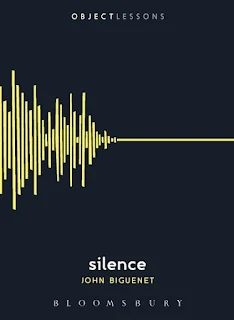* Copy courtesy of Bloomsbury Australia *
It's time for another book from the Object Lessons series by Bloomsbury Academic and this time it's Silence by John Biguenet. By far, the most enjoyable of the series for me to date, John Biguenet is a playwright and novelist and in Silence he explores many aspects of sound and the lack of it, and I enjoyed his observations.
As a human race, we generate and consume sound in the form of communication, work, travel, music and entertainment, and much of what we do generates noise; think cars, appliances and general day-to-day living. Ironically, we're also seeking to quieten our lives through the purchase of sound cancelling earphones and whisper quiet kettles. Quiet carriages on trains are available for passengers not wanting to be disturbed by the sounds of phones chirruping, people talking or music playing.
Silence is often a luxury, it can be expensive and is richly sought after in wellbeing retreats and meditation. In contrast, silence can be used as a form of punishment in cases of solitary confinement. In silence, some of us find peace and tranquility, where others experience fear, loneliness and perhaps even the stubborn ringing of tinnitus.
We live in a world full of noise but most of us have our own tolerance levels regarding what constitutes good noise, loud noise, unacceptable noise, and irritating noise. Writing this from lockdown in Melbourne, I was excited when a neighbour began playing his electric guitar from a balcony a few nights ago. However other neighbours were quick to complain about the noise on social media. It's clear that what can delight some, is intrusive to others.
Some of us might relate to the frustration of being unable to find peace and quiet when working from home. I've had to tolerate construction noise at all hours for years here in Southbank, however this struggle isn't entirely new. I loved discovering that:
"The men whose labors brought forth the Constitution of the United States had the street outside Independence Hall covered with earth so that their deliberations might not be disturbed by passing traffic." Page 20I love tidbits from history like that. Biguenet also comments on another of my favourite topics, the nature of silent reading and the auditory voice - or inner voice - we experience when we read to ourselves.
It turns out our forebears weren't so different from us, and that 'infernal racket' has troubled human beings for centuries. As such, I enjoyed following Biguenet's reflections on silence and sound and learned that:
"The quietest place on earth, an anechoic chamber at Orfield Laboratories in Minnesota, is so quiet that the longest anybody has been able to bear it is 45 minutes." Page 19The closest I came to achieving complete silence was in a sensory deprivation tank or float tank and the experience was illuminating.
Silence by John Biguenet is full of interesting observations in this collection of essays and I highly recommend it.




































